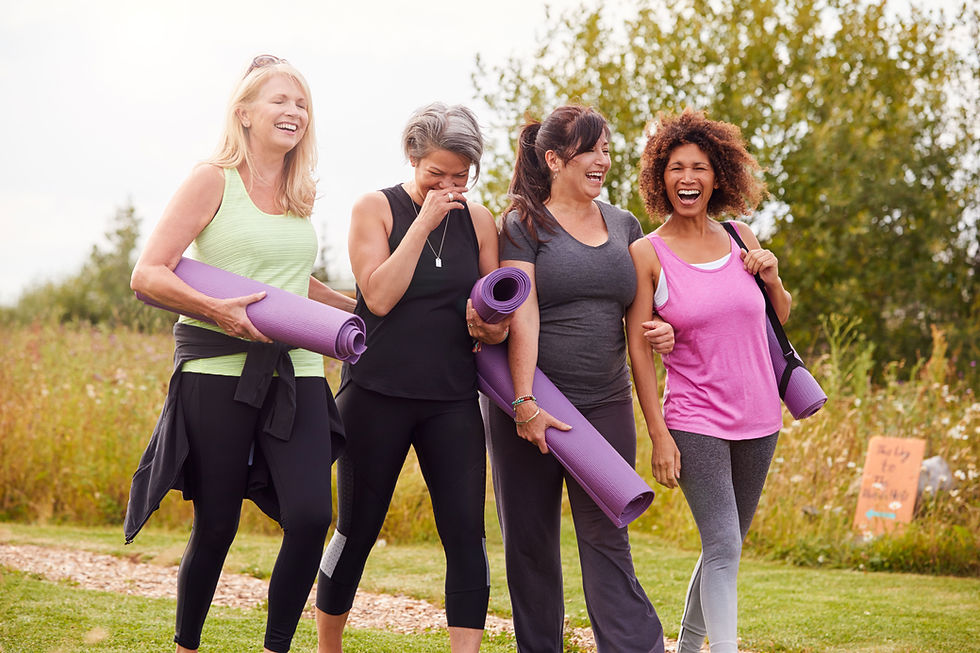Just breathe...
- lbanksunlimited
- Sep 17, 2021
- 3 min read

How often do you hear these two words? Or see a meme telling you to remember to breathe. It seems to me a fairly common place and rather flippant little two words. I say it myself, generally to a much younger person who is flipping out, to take a big deep breathe. It helps. It is also, at that stage in the game;
Shutting the gate after the horse has bolted!
So telling people to just breathe is a bit of a bug bare of mine. I'd love it if we could stop telling people to breathe and start teaching them techniques to master their breathing. This is a subtle shift.
When you are panicking or unable to sleep in the middle of the night, upset with your partner, angry at work...the last thing you are usually doing, is breathing deeply. In fact, for most of us, our learned responses and natural bodily reactions are to move to upper body breathing, hunched shoulders and a shorter more rapid breath.
Google the words 'just breathe' and see the amount of images that come up. It is worrying.
It seems ridiculous to me because learning to breathe more deeply and mastering some breath techniques to use when you need them is one of the easiest things that I have ever learnt. Unlike running, learning an instrument, surfing - any activity - you are literally sat on your bottom with your eyes closed.
However, it does take practice and you need to be committed.
My first forays in to the art of breathing began with my first yoga teacher 's training. It wasn't the yoga that helped though, it was the meditation practice that we were required to do at home. In fact, I was so uncomfortable with sitting for 10 minutes at a time, doing nothing, that the only thing that kept me there, was deep breathing and counting the length of my inhales and exhales.
It is easy to criticise. So what would I suggest?
Here are my top five suggestions
1. Listen to meditations online. I used The Honest Guys as I love their guided meditations - especially the ones that take place in Hobbiton! They give very clear breathing instructions for at least 5 minutes. I used to listen to one every night to help me sleep. Many of them are only 15 minutes long.
Or take an online course. I have done several through Commune.
Schuyler Grant has a free breathwork and stretching course starting on September 7 called
2. Establish a routine for practice. Every single time I drove somewhere, I would practice my breathing before I got out of the car. I practiced a technique called 4-7-8. You breath in for 4 counts, hold your breath for 7 counts and exhale out of your mouth for 8 counts. You do this three times.
It takes roughly one minute. This particular breath calms the central nervous system, instantly.
One minute. Every time you arrive somewhere.
I discovered that it really set me up for my day. I paused, I breathed and then I arrived.
3. Walk and breathe. This then has the added benefit of becoming a walking meditation. It really helps to count your breath when you do this. So three counts in and three counts out and then when you get used to it, you can make it longer. Four breaths in or increase your inhales by one count every few breaths. I believe this simple practice makes you far more aware of your breathing and it becomes a conscious act.
As soon as it is a conscious act, you are in a better position to call on it when you most need to be in control of your breathing.
4. Take one big breath every morning before you move or get out of bed.
This helps you wake up and also gives you a chance to check in with your body and how it feels.
5. Use the mantra in the picture above. The simple act of saying to yourself, "I breath in" and "I breath out" in time with your breathing makes breathing a far more conscious act and helps you visualise the process of oxygen entering and CO2 exiting your body. This practice reminds me of learning my times tables as a child. Repetition works.
I use this mantra when I am in savasana at the end of a yoga practice. I combine it with my hands on my belly to reinforce the message getting to my brain.
I firmly believe that any of the above techniques work when practiced everyday for at least 21 days in a row. A new skill needs to be imbedded and once it is, you might just remember to pause and breathe before you respond.
Please message me for any other tips on breathing techniques.
Lisa




Comments